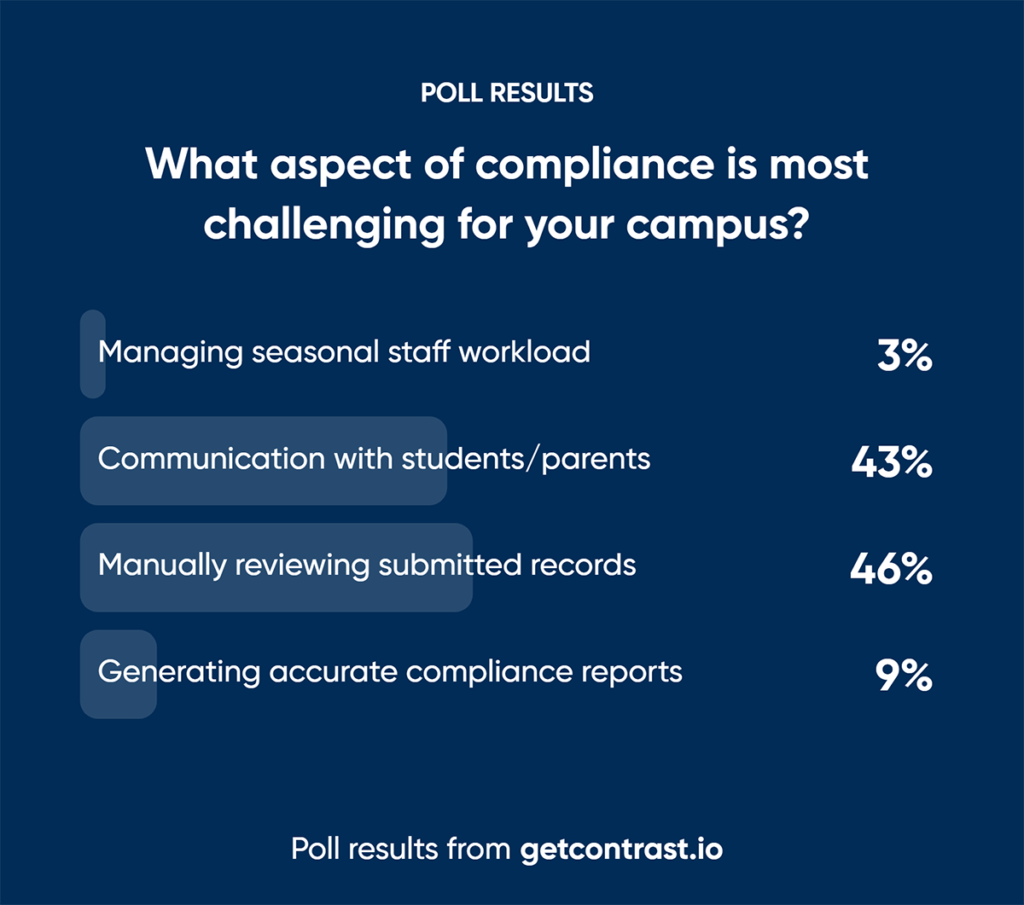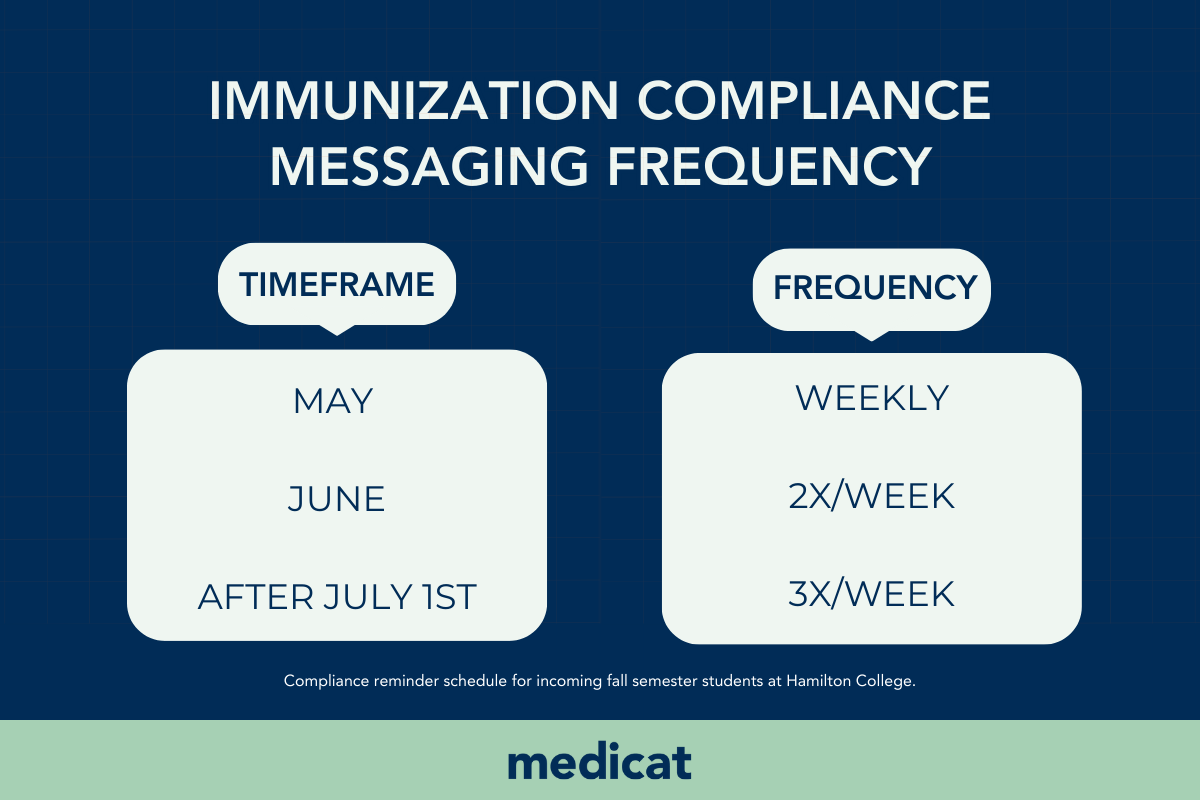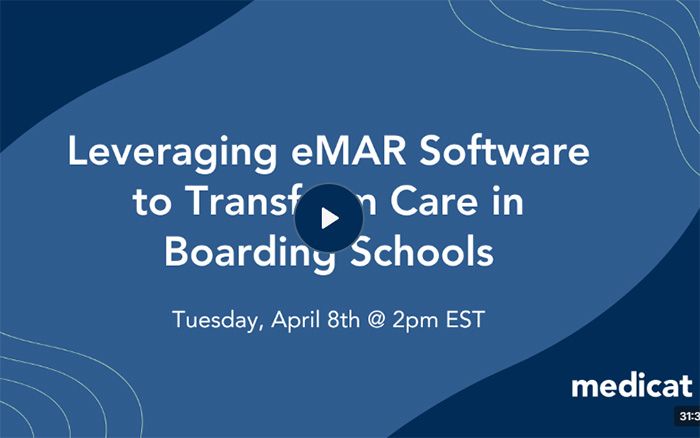8 Expert Tips For Making Immunization Compliance Simpler
For colleges and universities, staying on top of student immunization records can be a real headache. But with the right strategies and technology, it’s possible to create a smooth and efficient process.
In our recent webinar, we spoke with two seasoned college health professionals, Theron Stancil, Assistant Director of Health Services at Georgia Tech, and Barbara Fluty, Director of the Health Center at Hamilton College. They discussed how their schools tackle common challenges and optimize their workflows. Here are their key insights:
1. Automating for Efficiency
Both Theron and Barbara emphasized the transformative power of automation. They highlighted two key tools:
- State Registry Interfaces: These integrations allow for seamless transfer of immunization data directly from state registries into your system, eliminating manual data entry, speeding up document review, and reducing errors.
- VeriVax: This platform enables students who received immunizations out-of-state to electronically request and submit their immunization records, saving considerable time and effort for both staff and students.
Theron’s school saw a 30% reduction in manual record reviews after implementing these tools! Learn more about Georgia Tech’s wins.
2. The Communication Conundrum
Effective communication with students and parents about requirements is one of the trickiest aspects of compliance success. During the webinar, 43% of our audience claimed that was the most challenging part of compliance on their campuses.

Moreover, Theron’s team discovered through student surveys that their initial communication strategies weren’t as effective as they thought. They revamped their website, creating separate instructions for different student groups (in-state, out-of-state, international), providing detailed guides with screenshots, and clarifying confusing requirements like TB screening.
At Hamilton College, Barbara stressed the importance of concise messaging, using bullet points instead of paragraphs, and the value of persistent reminders.
As an example, here’s how they keep incoming fall semester students on track:

3. Staffing Strategies for Peak Seasons
In college health, the summer months typically bring the highest volume of compliance tasks.
At Hamilton College, Barbara relies on her dedicated nursing staff to handle the summer rush, while, at Georgia Tech, they’ve utilized staff from their travel immunization and allergy clinic who have more availability during the summer months.
P.S. Find tips for preventing staff burnout here.
4. Gathering Student Feedback: The Key to Improvement
Student feedback is essential for refining compliance processes and improving communication.
Theron’s team surveyed to identify pain points in the compliance process. While students provided more feedback on challenges than solutions, the insights led to website improvements, including clearer instructions, detailed requirements, and better visibility for key details like TB screening.
Barb’s team takes a more informal approach, using direct student feedback to make small but meaningful adjustments. They focus on ensuring forms are easy to find and instructions are concise and accessible.
Whether through surveys or casual conversations, student insights help simplify compliance and enhance the student experience.
Expand your communication strategy by incorporating social media for health promotion.
5. Managing Exemptions and Waivers
Both Hamilton College and Georgia Tech take a discreet approach to student immunization exemptions, avoiding widespread publicity.
Hamilton College utilizes waivers for students declining the MenACWY vaccine, streamlining the process through their student portal.
Similarly, Georgia Tech doesn’t advertise exemptions, but provides information upon request, offering permanent medical, temporary medical, and religious exemptions.
Beyond exemptions, Georgia Tech strategically uses waivers to track students completing a vaccine series, reminding them of upcoming doses and preventing them from falling out of compliance. This proactive approach helps manage the process smoothly and efficiently.
6. Enforcement Strategies
Schools have found creative ways to enforce compliance. Georgia Tech shifted from a pre-registration hold to a two-week grace period after the semester starts, followed by a registration hold that prevents students from future registration or course changes.
Hamilton College, on the other hand, begins with a registration hold for all new students, releasing it after verification. They offer a one-week reprieve for students actively working towards compliance-specifically during the week that class schedules are released.
For students who remain non-compliant, Hamilton College partners with the Dean of Students Office, potentially leading to conduct processes and, as a last resort (and mandated by New York State law), barring students from classes after 30 days of non-compliance.
Another way Hamilton College enforces compliance is by disabling student swipe card access to buildings. This, along with support from the Dean of Students, has helped them keep compliance rates high.
7. International Student Compliance
Managing international student records presents unique challenges for many institutions.
Theron encourages international students to have their healthcare providers transcribe records onto their required immunization forms. They also offer an event before the fall semester for students to complete their requirements on-site.
For TB screening, Theron’s institution requires international students to undergo a blood test. Positive results lead to a chest X-ray and a meeting with a provider.
Barb’s institution screens all students for TB risk, with international students often identified as high-risk. They encourage these students to take a QuantiFERON test, which is covered by their student health insurance plan.
8. Reporting and Data Analysis
Access to accurate and timely reports is essential for managing compliance effectively and ensuring that no student is overlooked in the process. Robust data tracking allows health teams to stay organized, streamline communication, and implement targeted interventions where necessary.
Both Theron and Barb utilize Medicat’s reporting features to monitor compliance levels, identify non-compliant students, and track their progress toward meeting requirements. These reports provide valuable insights that help them prioritize follow-up actions, ensuring that students who need extra attention are not missed.
At Georgia Tech, Theron uses these reports to segment students into specific groups, enabling his team to send targeted, tailored messages to address particular needs or concerns. This approach enhances communication, improves engagement, and helps students stay on track to meet compliance deadlines.
Key Takeaways
With the right strategies and technology, colleges can streamline immunization compliance while reducing staff workload. Automation, clear communication, and strategic staffing make a significant impact. Schools that gather student feedback and use targeted messaging see better engagement and fewer compliance issues. Plus, effective data tracking ensures no student falls through the cracks.
Small changes lead to big improvements. Simplifying instructions, refining reminder texts and emails, and leveraging automation can make compliance easier for everyone.























